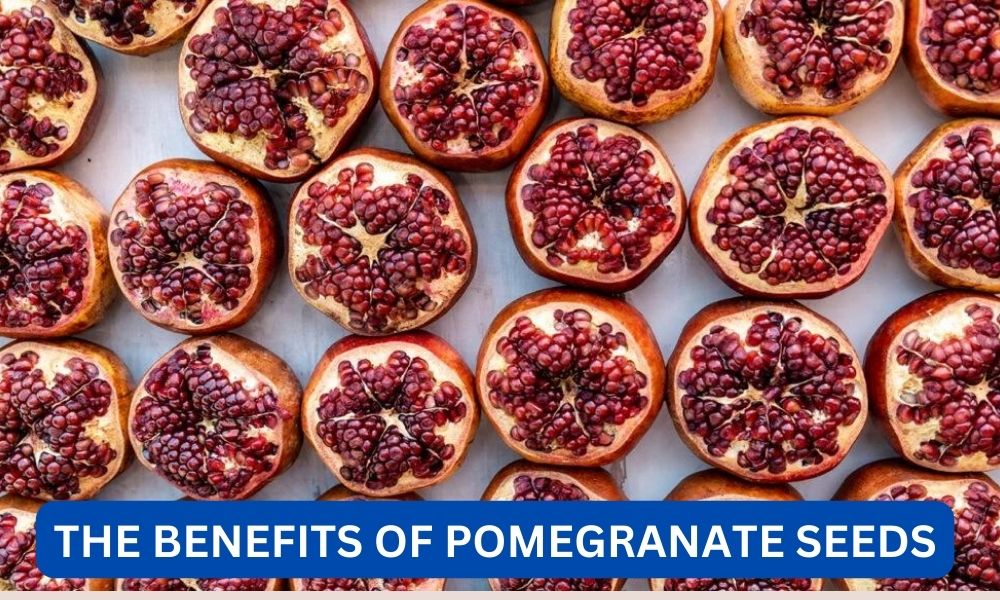Pomegranates have been revered for their health benefits for centuries. This ancient fruit has been mentioned in religious texts and used in traditional medicine for its medicinal properties. Today, pomegranates are gaining popularity as a superfood, and for good reason. The ruby-red seeds of this fruit are packed with essential nutrients and powerful antioxidants that can benefit our overall health in numerous ways. In this article, we will delve into the benefits of eating pomegranate seeds and why you should consider adding them to your diet.
Contents
What are Pomegranate Seeds?
Pomegranate seeds, also known as arils, are the small, juicy, red seeds found inside the pomegranate fruit. Each pomegranate contains hundreds of these seeds, which are surrounded by a white, spongy membrane. These seeds are edible and have a sweet and tangy flavor, making them a popular addition to salads, smoothies, and desserts.
Pomegranates are native to the Middle East and have been cultivated for thousands of years. They are now grown in many parts of the world, including the United States, Spain, and India. The fruit is in season from September to February, making it a perfect winter fruit to add to your diet.
Read:What are the benefits of fenugreek?Nutritional Value of Pomegranate Seeds
Pomegranate seeds are a rich source of essential nutrients that are vital for our overall health. According to the United States Department of Agriculture (USDA), one cup (174 grams) of pomegranate seeds contains:
- Calories: 144
- Carbohydrates: 38 grams
- Fiber: 7 grams
- Sugar: 24 grams
- Protein: 3 grams
- Fat: 2 grams
- Vitamin C: 28% of the Recommended Daily Intake (RDI)
- Vitamin K: 36% of the RDI
- Folate: 16% of the RDI
- Potassium: 12% of the RDI
- Other vitamins and minerals, including calcium, magnesium, and iron
Pomegranate seeds are also a good source of antioxidants, including polyphenols, flavonoids, and tannins. These antioxidants help protect our cells from damage caused by free radicals, which can lead to chronic diseases such as cancer and heart disease.
Health Benefits of Eating Pomegranate Seeds
The nutritional profile of pomegranate seeds makes them a powerhouse of health benefits. Let’s take a closer look at some of the ways in which these tiny seeds can improve our health.
1. Rich in Antioxidants
As mentioned earlier, pomegranate seeds are a rich source of antioxidants. These compounds help neutralize free radicals and prevent oxidative stress, which can damage our cells and lead to chronic diseases. Studies have shown that pomegranate seeds have higher antioxidant activity than other fruits, including blueberries and cranberries.
Read:What are the benefits of slippery elmOne study found that pomegranate juice had three times more antioxidant activity than red wine and green tea. This is due to the presence of punicalagins, a type of antioxidant found in pomegranates that is responsible for most of its health benefits.
2. May Lower Blood Pressure
High blood pressure, also known as hypertension, is a major risk factor for heart disease. Studies have shown that pomegranate juice can help lower blood pressure in people with hypertension. In one study, participants who drank 150 ml of pomegranate juice daily for two weeks saw a significant reduction in their blood pressure levels.
This effect is attributed to the high levels of polyphenols in pomegranate seeds, which can help relax blood vessels and improve blood flow. However, more research is needed to confirm these findings.
3. May Improve Heart Health
The antioxidants in pomegranate seeds can also benefit our heart health in other ways. Studies have shown that pomegranate juice can help reduce LDL (bad) cholesterol levels and increase HDL (good) cholesterol levels. This can help lower the risk of heart disease and stroke.
In addition, pomegranate seeds contain a compound called punicic acid, which has been found to have anti-inflammatory effects and may help prevent atherosclerosis, a condition where plaque builds up in the arteries and can lead to heart disease.
Read:What are the health benefits of coffee?4. May Help Fight Cancer
Pomegranate seeds have been studied for their potential anti-cancer properties. Some studies have shown that the antioxidants in pomegranate seeds can help inhibit the growth of cancer cells and even induce apoptosis (cell death) in cancer cells.
In one study, pomegranate extract was found to be effective against breast cancer cells, while another study showed that it could help prevent the growth of prostate cancer cells. However, more research is needed to determine the exact mechanisms and potential benefits of pomegranate seeds in cancer prevention and treatment.
5. May Improve Memory and Brain Function
The antioxidants in pomegranate seeds can also benefit our brain health. Studies have shown that pomegranate juice can help improve memory and cognitive function in older adults. In addition, the polyphenols in pomegranate seeds may help protect against neurodegenerative diseases such as Alzheimer’s and Parkinson’s.
One study found that pomegranate extract could help reduce inflammation and oxidative stress in the brain, which are believed to be major contributors to these diseases. However, more research is needed to confirm these findings.
6. May Help Improve Erectile Dysfunction
Erectile dysfunction (ED) is a common condition that affects many men. It is characterized by the inability to achieve or maintain an erection. Studies have shown that pomegranate juice can help improve erectile dysfunction by increasing blood flow to the penis.
In one study, men with mild to moderate ED who drank pomegranate juice daily for four weeks saw a significant improvement in their erectile function. This effect is believed to be due to the high levels of antioxidants in pomegranate seeds, which can help improve blood flow and reduce inflammation.
How to Incorporate Pomegranate Seeds into Your Diet
Pomegranate seeds can be enjoyed in many ways, making it easy to incorporate them into your diet. Here are some ideas:
- Add them to salads for a burst of flavor and crunch.
- Blend them into smoothies for a nutritious and refreshing drink.
- Sprinkle them on top of yogurt or oatmeal for a healthy and delicious breakfast.
- Use them as a topping for ice cream or frozen yogurt.
- Make a pomegranate salsa to serve with grilled chicken or fish.
- Use them as a garnish for cocktails or mocktails.
You can also buy pomegranate juice or extract if you prefer not to eat the seeds. However, keep in mind that whole pomegranate seeds contain more fiber and nutrients than juice or extract.
Precautions and Potential Side Effects
Pomegranate seeds are generally safe for most people to consume. However, some individuals may experience allergic reactions to pomegranates, especially if they are allergic to other fruits such as peaches and apples.
In addition, pomegranate juice may interact with certain medications, including blood thinners and blood pressure medications. If you are taking any medications, it is best to consult with your doctor before adding pomegranate seeds to your diet.
Conclusion:
Pomegranate seeds are a delicious and nutritious addition to any diet. They are packed with essential nutrients and powerful antioxidants that can benefit our overall health in numerous ways. From improving heart health to fighting cancer and improving brain function, the benefits of eating pomegranate seeds are truly impressive. So, next time you see this ancient fruit at the grocery store, be sure to grab a few and enjoy the many health benefits it has to offer.









